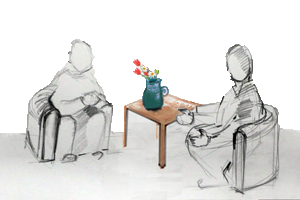What is counselling/therapy and how can it help?
I often use the words counselling and therapy interchangeably, although therapy is often longer term and may go to a deeper level than counselling. Having counselling or therapy is about meeting regularly, usually weekly, with a trained counsellor/therapist, in order to work through problems or challenges in your life. In a sense, counselling has existed as long as humani ty has - people have always found that talking to trusted others about what is troubling them can bring relief and renewed optimism.
ty has - people have always found that talking to trusted others about what is troubling them can bring relief and renewed optimism.
What happens in the first session?
In the first session we will talk about what brings you (whether an individual or couple) to counselling and what you want to get out of it. This is an opportunity for me to learn a little about you and what you may be struggling with. You can also get an idea about how I work and whether we will be a good fit. As well as talking about the issue that brings you, I will get some basic information about your work, relationships and family situation. I may also ask a little about your family background and childhood.
What is the evidence that counselling helps?
We live in an age where people often want hard evidence that something works, even though in the field of human experience, relationships and well-being it can be hard to objectively define, or measure, what a successful outcome is. Nevertheless, there has been significant research showing the benefits of counselling and therapy.
Research shows that much of the benefit of therapy is down to the relationship between therapist and client, regardless of the kind of therapy being practised. This suggests that it is the human connection that heals, rather than any specific 'techniques'.
The benefits of counselling
Counselling is not a quick fix, but rather a process that can help you feel better over time. It offers benefits such as:
- raising your self-esteem so that you feel better about yourself
- helping you improve your relationships
- increasing your self-knowledge and self-acceptance
- helping you come to terms with difficult experiences in your life
- increasing your assertiveness and being able to deal with conflict more effectively
- gaining new passion and enthusiasm in your life.
About Psychosynthesis
Psychosynthesis counselling and therapy takes a soulful approach. This means having a broader perspective on the problems someone brings. In many cases this can help you see your life in a different perspective - one that can bring a new sense of meaning and self-acceptance.
As well as exploring how the wounds of our past may be unconsciously influencing our present, a Psychosynthesis approach works with dreams and the imagination to more deeply investigate our deeper desires.


